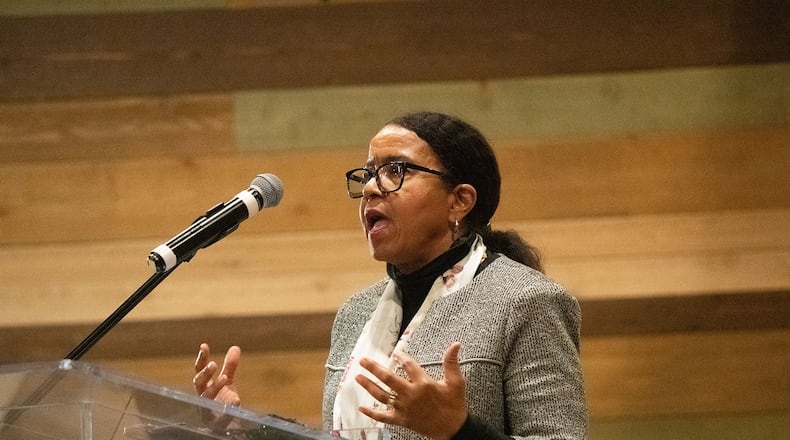One woman said her boyfriend, who is locked up at the Cobb County Detention Center, suffers from mental illnesses and has not been given his medication consistently.
Another woman said her husband hasn’t been able to contact his attorney to prepare for an upcoming trial due to a month-long lockdown. And a mother said her son was booked into the jail in April, but it was in October before he was able to appear before a judge for the first time.
Their stories were just a few of the experiences shared by Cobb residents about family members held at the Detention Center.
They gathered at Monday night’s town hall meeting organized by the ACLU of Georgia, Cobb County Southern Christian Leadership Conference, La Gente de Cobb and the Cobb County NAACP. More than 100 people attended the meeting and about 20 people spoke.
RELATED | Outcry over Cobb County jail deaths, conditions grows louder
Cobb County Sheriff Neil Warren and his department have come under criticism for a string of inmate deaths and a long-term lockdown that kept prisoners confined to their cells for weeks. Seven inmates have died while in custody during the past 12 months.
The Sheriff’s Office has rejected charges that staffing shortages at the jail have been behind the deaths and the lockdown, which went into effect in late September after two guards were allegedly assaulted by three inmates. The department argues that many of its inmates have a variety of preexisting medical conditions and as well as mental health conditions. Its medical staff provide initial health screening as well as ongoing medical treatment through third-party healthcare providers,” the sheriff’s office previously said.
The Cobb sheriff’s office currently has about 2,100 inmates housed at the jail. It receives and releases about 25,000 people per year, a sheriff’s spokesman said.
Like Cobb County News Now on Facebook | Follow on Twitter
Families of the prisoners inside the jail have sent a steady stream of letters and emails to the ACLU informing the organization about the lockdown. said Kosha Tucker, a staff attorney with the ACLU. During the lockdown, Tucker said families were not allowed to visit or call their relatives inside the jail.
“These are still very alarming concerns and that’s why we are here tonight to listen to all of you, (and for you) to let us know what you’ve experienced,” she said.
During the lockdown that started around Sept. 27 and ended Oct. 25, the inmates were kept in their cells for nearly 24 hours a day, allowed out for only 15 minutes each day to shower, Cobb County Sheriff’s Office spokesman Glenn Daniel confirmed to The Atlanta Journal-Constitution.
READ | Cobb settles lawsuit filed by inmate who was assaulted by deputy
Timothy Gardner, the attorney representing the family of Kevil Wingo, an inmate who died Sept. 29 after experiencing a "medical emergency" inside his cell, appeared at the town hall with Wingo's sister, Tiffany. Gardner said his investigation into Wingo's death indicated that the sheriff's office and its medical staff allegedly "failed to give him the appropriate medical attention he deserved."
He also said no one at the sheriff’s office reached out to the Wingo family following the death to offer condolences or speak to them about what happened. When Gardner and members of the family finally scheduled a meeting with sheriff’s office staff, he said that meeting was cancelled without any explanation. “These conditions are so extreme that every expert I’ve talked to in my case has said they’ve never seen anything like it,” Gardner said.
READ | Cobb inmate committed suicide after his family warned jail staff
One former inmate, Doug Jenkins, said he was released Sunday evening from the Cobb County Detention Center after spending about five months at the facility.
Jenkins, who was inside the jail during the lockdown, said being relegated to one’s cell for nearly 24 hours a day is enough to drive an inmate to consider accepting a guilty plea “because you don’t know how much longer you’re going to sit in there.”
Jenkins told the audience he was guilty of the crime he committed, but said he and other inmates “didn’t deserve to be on lockdown.”
The woman who said it took several months before her son could appear before a judge said she was told her son’s case was “lost” in the system. Her son, who is 25, told her he feels like he’s “losing his mind” while incarcerated, she said. He was offered a plea deal where he would serve three years, and she said he’s thinking about accepting the offer “just to get out of this hell hole.”
“He’s just terrified,” she said.
READ | Mentally ill man died of dehydration after nine days in Cobb jail
Cindi Yeager, a Marietta defense attorney, said she had one client, a 22-year-old man, who was in jail for seven weeks with a $2,000 bond. He was unable to bond out of jail because he wasn’t allowed to make phone calls during the lockdown. She also called on residents in the audience to ask Cobb County District Attorney Joyette Holmes to launch an investigation into how the Sheriff’s Office operates the jail.
Organizers of the town hall meeting encouraged residents to attend Marietta City Council’s meeting at 7 p.m. Wednesday to speak out against a proposed agreement with the Sheriff’s Office to house city inmates at the Detention Center. They were also asked to speak against the same proposal at the Cobb Board of Commissioners’ meeting at 6 p.m. Dec. 16.
Cobb County Detention Center story so far:
- Seven Cobb County Detention Center inmates have died while in custody within the last 12 months
- Cobb County inmates were placed on a month-long lockdown in late September after three inmates allegedly attacked two guards.
- More than 100 attended Monday's town hall meeting with the ACLU of Georgia, Cobb County Southern Christian Leadership Conference, La Gente de Cobb and the Cobb County NAACP
About the Author
The Latest
Featured







